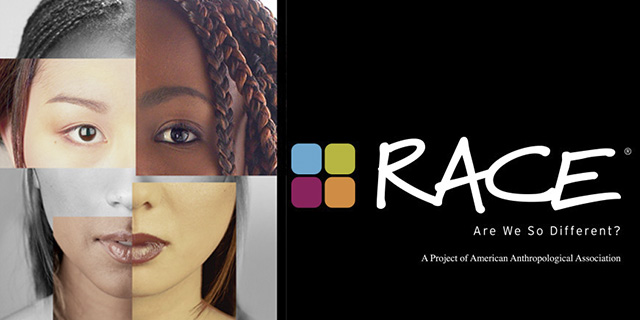Museum opens “RACE: Are We So Different?” exhibition April 22
For immediate release ‐ January 18, 2017
Contact: Emelia Cowans, 919.707.9837. Images available upon request

N.C. Museum of Natural Sciences hosts free exhibit about the science, history and lived experiences of race in America, April 22–September 4
RALEIGH — The North Carolina Museum of Natural Sciences is pleased to announce that it will host the award-winning exhibition RACE: Are We So Different? from April 22 to September 4, 2017. Three thematic elements make this exhibit transformative in every way — the everyday experience of living with race, its history as an idea, and the findings of contemporary science that are challenging its foundations. Appropriate for all ages, RACE includes interactive exhibit components, artifacts, iconic objects, compelling and historical photographs, multimedia presentations, attractive graphic displays, and thought-provoking questions that offer visitors to RACE an eye-opening look at its important subject matter. Visitors can also explore genetics and biology in the human variation area, play the game of life, read blogs and take quizzes. An exhibit of this magnitude would normally require an entry fee, however thanks to more than $300,000 in support, the Museum will provide an unprecedented public service to the people of North Carolina by removing barriers and offering free admission into this exhibit.
“With its anthropological approach, the award-winning exhibition RACE: Are We So Different? strongly demonstrates the contemporary aspect of this institution’s mission to illuminate the independence of nature and humanity,” says Museum Director, Emlyn Koster, PhD. “This learning experience enables our diverse society to delve together into science-based questions about human similarities and variations. It is the right thing, at the right time, in the right way.”
Throughout the run of RACE, the Museum will offer supplemental programming that serves to foster constructive dialogue and eye-opening revelations about race and racism in everyday life. Programming includes talking circles, lectures, panel discussions, a celebration of poetry, dance, and music, and films. Middle and High School educational materials and a family guide for parents on how to talk to their kids about race are available on the Museum’s website at naturalsciences.org/race. Some exhibit content is also available in Spanish. Algunas partes de la exhibición estarán disponibles en español.
RACE was developed by the American Anthropological Association with funding from the Ford Foundation and the National Science Foundation. The exhibition is presented locally by the A.J. Fletcher Foundation, with additional support from the Duke Energy Foundation, the City of Raleigh, the Wells Fargo Foundation, the Z. Smith Reynolds Foundation and the NC Department of Natural and Cultural Resources. Additional programmatic support is provided by BB&T, the Burroughs Wellcome Fund, the Duke University Center on Genomics, Race, Identity, Difference and the Paul Green Foundation. The Museum has also partnered with the North Carolina Museum of History, Morehead Planetarium and Science Center, and the YMCA of the Triangle.
For more information about RACE: Are We So Different?, contact Emelia Cowans-Taylor at 919.707.9837 or via email at emelia.cowans@naturalsciences.org
About the North Carolina Department of Natural and Cultural Resources
The N.C. Department of Natural and Cultural Resources (NCDNCR) is the state agency with a vision to be the leader in using the state’s natural and cultural resources to build the social, cultural, educational and economic future of North Carolina. NCDNCR’s mission is to improve the quality of life in our state by creating opportunities to experience excellence in the arts, history, libraries and nature in North Carolina by stimulating learning, inspiring creativity, preserving the state’s history, conserving the state’s natural heritage, encouraging recreation and cultural tourism, and promoting economic development.
NCDNCR includes 27 historic sites, seven history museums, two art museums, two science museums, three aquariums and Jennette’s Pier, 39 state parks and recreation areas, the N.C. Zoo, the nation’s first state-supported Symphony Orchestra, the State Library, the State Archives, the N.C. Arts Council, State Preservation Office and the Office of State Archaeology, along with the Division of Land and Water Stewardship. For more information, please call (919) 807-7300 or visit www.ncdcr.gov.

